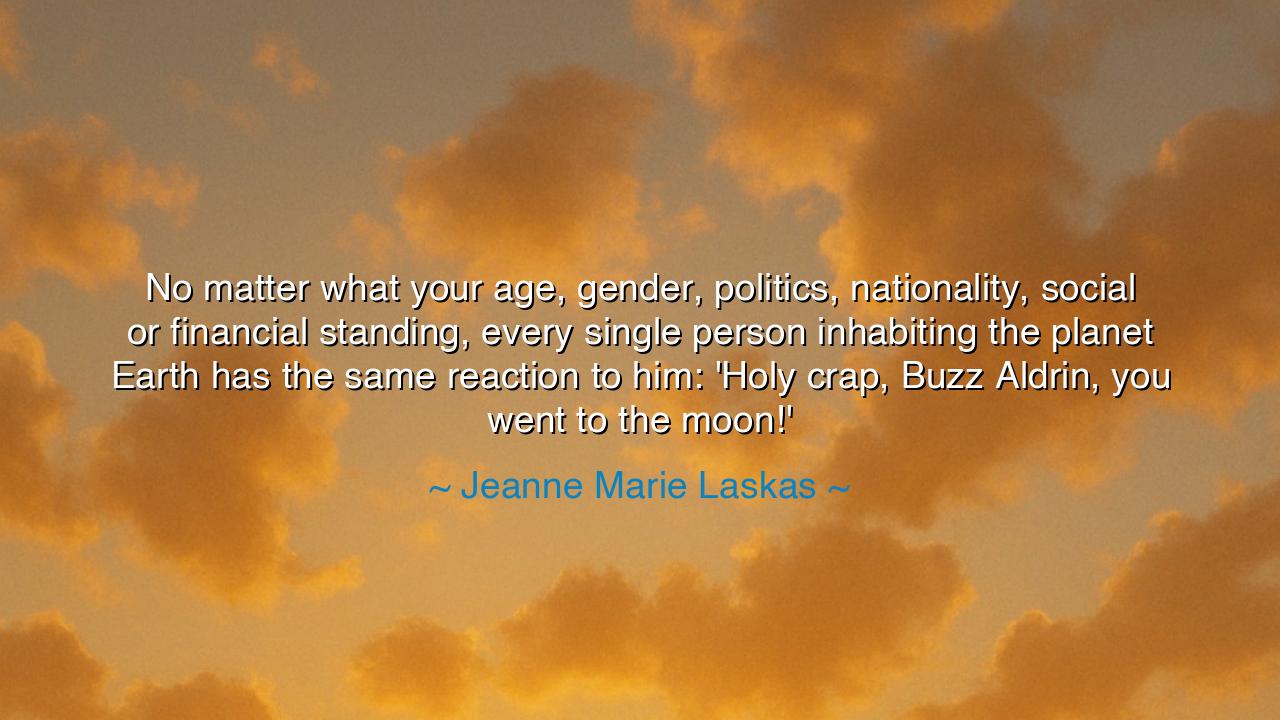
No matter what your age, gender, politics, nationality, social or
No matter what your age, gender, politics, nationality, social or financial standing, every single person inhabiting the planet Earth has the same reaction to him: 'Holy crap, Buzz Aldrin, you went to the moon!'






"No matter what your age, gender, politics, nationality, social or financial standing, every single person inhabiting the planet Earth has the same reaction to him: 'Holy crap, Buzz Aldrin, you went to the moon!'" These words, spoken by Jeanne Marie Laskas, carry a powerful and universal truth about the extraordinary nature of human achievement. Laskas captures the essence of what it means to do the impossible, to reach beyond the confines of the known world, and to become a symbol not just of individual success, but of the triumph of all humanity. Buzz Aldrin, one of the first two men to walk on the moon, is a figure whose name resonates with awe and wonder, and Laskas' words highlight how such an accomplishment transcends all barriers—be they age, gender, politics, nationality, or social status—uniting us all in a shared moment of amazement.
When Aldrin set foot on the surface of the moon on July 20, 1969, during the Apollo 11 mission, it was a moment of immense significance not only for the United States but for the entire world. The event was a demonstration of what humanity can achieve when we push beyond the limits of our understanding, daring to venture into the great unknown. The very notion of walking on the moon was once confined to the realms of myth and imagination. Yet, in that single moment, the boundaries of possibility were shattered. Laskas reminds us of the commonality of that awe. No matter where one stands in the world, no matter their background, the reaction to Aldrin’s achievement is the same: pure amazement.
Consider the story of Christopher Columbus, whose voyages to the New World were once met with similar awe. The man who traversed the vast, uncharted oceans, braving treacherous seas and navigating by the stars, embodied the human spirit of discovery. When Columbus first laid eyes on the shores of the Americas, it was an event that reverberated throughout the world, shifting the course of history. Much like Aldrin’s moon landing, Columbus’ journey was a triumph that transcended nations, and his name became synonymous with exploration and fearlessness. Both Aldrin and Columbus remind us that great feats unite us, stirring the hearts of people from all walks of life.
In reflecting upon Aldrin's achievement, Laskas touches upon the universality of inspiration. The moon landing was not simply a victory for one nation, or for the privileged few; it was an event that belonged to all. It spoke to the innate desire within every human being to break barriers and to reach for something greater. For in each of us lies the dream of the impossible made real, and Aldrin’s walk on the moon serves as proof that such dreams are not only possible but achievable. It was a victory for humanity itself, a shared triumph that transcends individual circumstances and brings us all together in wonder.
There is a great lesson to be learned here. The moon landing reminds us that the most profound achievements are not measured by the material wealth or social standing one possesses, but by the courage to reach beyond what is known, to venture into new realms, and to dream big. Aldrin did not land on the moon as a politician, a rich man, or a man of particular social rank. He did so as a human being with a dream, and that dream was shared by countless others. In that moment, all people, regardless of their circumstances, felt the power of human potential. It is a reminder that we, too, are capable of achieving greatness, and that the barriers we often perceive as insurmountable are but illusions.
Practical action is found in the spirit of persistence, curiosity, and courage. Just as Aldrin and his fellow astronauts persevered through countless trials and tribulations to make the moon landing a reality, so too must we strive toward our own impossible dreams. The lesson here is not to be daunted by the scope of our goals, but to remain steadfast and determined. Whether the challenge is large or small, let us remember that greatness lies not in the accolades we receive, but in the courage to pursue what others deem impossible. Like Aldrin, we must have the boldness to take that first step, even if it seems beyond reach.
In conclusion, Laskas' words remind us of the power of human achievement to unite us, to transcend the barriers that divide us, and to inspire generations to come. Just as Buzz Aldrin’s journey to the moon represents the boundless possibilities of what humanity can accomplish, so too does it call upon us to dream without limits. May we, too, reach for the stars, knowing that the shared achievement of one becomes the shared victory of all.






AAdministratorAdministrator
Welcome, honored guests. Please leave a comment, we will respond soon